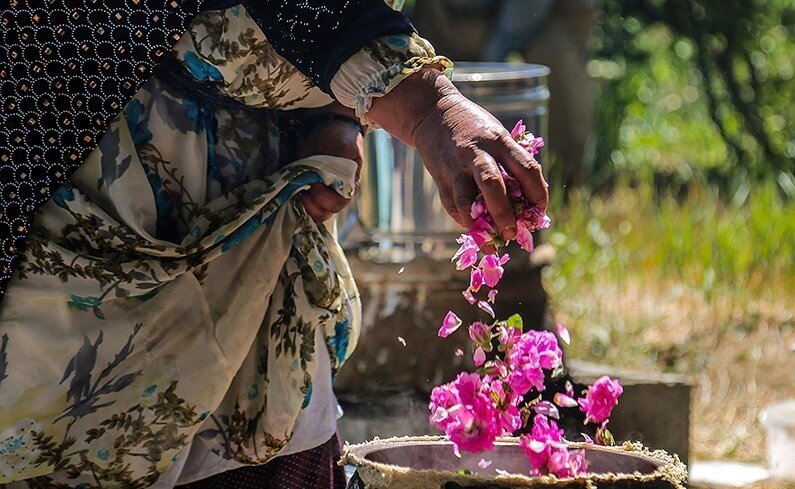Kordestan village to host rosewater festival

TEHRAN –A rosewater distillation festival, commonly known as “Golab-giri”, is scheduled to be held in a village near Sanandaj, the capital of the western Kordestan province on Friday, a local tourism official has said.
The festival seeks to showcase the potential of agritourism in the area while preserving and passing down the age-old customs to the youth, Amir Sadeqi explained on Tuesday.
Every year in May and June, hundreds of Golab-Giri festivals take place, where roses reign and fragrant dreams come true. For centuries, the delights of fragrant roses have taken center stage in Kashan and surrounding lands, as honored guests and locals pluck petals with gentle care and joy.
Iran has a long history of concentrating flowers and herbs. Many people think that traditionally distilled rose water is of higher quality than rose water made in factories, likely due to the faster harvesting and distillation processes.
Traditionally, rose water is made from a flower with a very sweet scent, best known in the country as Mohammadi roses. In the early morning, the flower harvest is almost complete. Rumor has it that delays in harvesting or transporting it to the distillery are causing a drop in the quantity and quality of essential oils. Each pot is filled with 80 liters of water and almost 30 kilograms of rose petals, and connected with metal pipes, allowing steam to flow through to create the hydrosol. Distillation waste can be composted or fed to animals.
A therapeutic effect is attributed to rose water and rose oil. Some claim that rose oil calms the mind and relieves anxiety, stress, and depression. Stories have it that rosewater-based products can help with digestive problems, colds, and skin problems.
A cherished event in Iranian culture, Golab-Giri is also a celebration of Iranian generosity and hospitality in addition to the harvest of roses.
Agritourism in Iran
Agritourism is a relatively new branch of the travel industry in which tourists stay with locals in rural areas. Farm/ranch recreation refers to activities conducted on private agricultural lands, which might include fee-hunting and fishing, overnight stays, educational activities, etc.
Agritourism and nature-tourism enterprises might include outdoor recreation (fishing, hunting, wildlife study, horseback riding), educational experiences (cannery tours, cooking classes, or tea or coffee tasting), entertainment (harvest festivals or barn dances), hospitality services (farm stays, guided tours, or outfitter services), and on-farm direct sales (u-pick operations or roadside stands).
Agritourism is a subset of a larger industry called rural tourism that includes resorts, off-site farmers' markets, non-profit agricultural tours, and other leisure and hospitality businesses that attract visitors to the countryside.
Rural tourism is said to differ from agritourism in some ways. For instance, rural tourism enterprises do not necessarily occur on a farm or ranch, or at an agricultural plant. They do not generate supplemental income for the agricultural enterprise.
To cite an example, we could refer to saffron farms in northeast Iran that are going to fame as a new destination for agritourism. Iranian Saffron is known as the “red gold”, saffron is a magical ingredient in Persian culture, from aromatic foods and colorful desserts to physical and spiritual medicine.
Experts believe that agritourism pays special attention to the production sector, saying “For this reason, agricultural tourism is much more important and practical than other branches of tourism because it creates a new chain and diversity in the field of production and services.”
ABU/
Leave a Comment